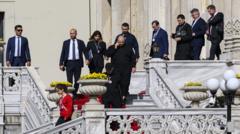Despite the ongoing conflict and the pressing need for a ceasefire, both nations are still far apart, with little indication of progress.
Russia and Ukraine Clash in Peace Talks, Agree on Prisoner Exchange Only

Russia and Ukraine Clash in Peace Talks, Agree on Prisoner Exchange Only
A disappointing second round of negotiations sees Russia and Ukraine emphasizing divisions over ceasefire agreements, yet they manage to arrange a prisoner swap.
In the Turkish city of Istanbul, a second round of direct negotiations between Russia and Ukraine concluded with minimal advancements, primarily an agreement on the exchange of prisoners of war. Ukrainian officials reported that their request for an "unconditional ceasefire" was met with rejection from the Russian delegation. Instead, Russia proposed a temporary truce lasting only two to three days in specific areas, although details were scant.
The talks, which lasted just over an hour, resulted in a commitment to return the remains of 12,000 fallen soldiers, a grim acknowledgment of the continued toll of the conflict. Ukrainian Defense Minister Rustem Umerov, leading Kyiv's negotiations, reiterated Ukraine's demand for a comprehensive ceasefire lasting at least 30 days across land, air, and maritime zones to "end the killings now."
Both sides entered the meeting with low expectations, reflecting their extensive divisions over how to conclude a war that has persisted since Russia's full-scale invasion of Ukraine in February 2022. Currently, Russia holds approximately 20% of Ukrainian territory, including Crimea, annexed in 2014.
In response to Russia's offer for a temporary ceasefire to recover fallen soldiers, President Volodymyr Zelensky expressed frustration on social media, highlighting that the purpose of a ceasefire is precisely to halt deaths.
While details of both sides' ceasefire proposals remain undisclosed, Russian state media has circulated what they claim are Moscow's conditions. These include demands for the withdrawal of Ukrainian forces from territories in the southeast, international recognition of four occupied regions, and a ban on Ukraine joining military alliances.
Ukrainian Deputy Foreign Minister Serhiy Kyslytsia confirmed the rejection of the unconditional ceasefire by Russia and also presented a list of children reported to have been forcibly taken to Russia.
Despite this setback, both parties agreed to proceed with the exchange of sick and heavily wounded prisoners, along with those under 25. Specific timelines for these exchanges have not been provided. Russian delegation head Vladimir Medinsky stated that Russia will return 6,000 Ukrainian bodies to Kyiv, while Ukraine will reciprocate with the bodies of 6,000 Russian soldiers.
Zelensky, who was present at a summit in Lithuania, remarked on the absence of meaningful signals from Russia regarding ending the war and emphasized the need to bolster defense capabilities alongside increasing sanctions on Russia.
The earlier round of talks on May 16 yielded similar results, marked only by an agreement to exchange 1,000 prisoners of war on each side. Zelensky and European allies have accused Russia of intentionally stalling negotiations to secure more territory. Meanwhile, U.S. President Donald Trump has been advocating for a rapid peace accord but has delayed imposing stricter sanctions on Russia while remaining open to a potential three-way summit with Zelensky and Putin.
In a recent statement, Trump characterized Putin as "absolutely crazy," reflecting the intense and troubling dynamics of the ongoing conflict as the world watches closely for developments in the negotiations.
The talks, which lasted just over an hour, resulted in a commitment to return the remains of 12,000 fallen soldiers, a grim acknowledgment of the continued toll of the conflict. Ukrainian Defense Minister Rustem Umerov, leading Kyiv's negotiations, reiterated Ukraine's demand for a comprehensive ceasefire lasting at least 30 days across land, air, and maritime zones to "end the killings now."
Both sides entered the meeting with low expectations, reflecting their extensive divisions over how to conclude a war that has persisted since Russia's full-scale invasion of Ukraine in February 2022. Currently, Russia holds approximately 20% of Ukrainian territory, including Crimea, annexed in 2014.
In response to Russia's offer for a temporary ceasefire to recover fallen soldiers, President Volodymyr Zelensky expressed frustration on social media, highlighting that the purpose of a ceasefire is precisely to halt deaths.
While details of both sides' ceasefire proposals remain undisclosed, Russian state media has circulated what they claim are Moscow's conditions. These include demands for the withdrawal of Ukrainian forces from territories in the southeast, international recognition of four occupied regions, and a ban on Ukraine joining military alliances.
Ukrainian Deputy Foreign Minister Serhiy Kyslytsia confirmed the rejection of the unconditional ceasefire by Russia and also presented a list of children reported to have been forcibly taken to Russia.
Despite this setback, both parties agreed to proceed with the exchange of sick and heavily wounded prisoners, along with those under 25. Specific timelines for these exchanges have not been provided. Russian delegation head Vladimir Medinsky stated that Russia will return 6,000 Ukrainian bodies to Kyiv, while Ukraine will reciprocate with the bodies of 6,000 Russian soldiers.
Zelensky, who was present at a summit in Lithuania, remarked on the absence of meaningful signals from Russia regarding ending the war and emphasized the need to bolster defense capabilities alongside increasing sanctions on Russia.
The earlier round of talks on May 16 yielded similar results, marked only by an agreement to exchange 1,000 prisoners of war on each side. Zelensky and European allies have accused Russia of intentionally stalling negotiations to secure more territory. Meanwhile, U.S. President Donald Trump has been advocating for a rapid peace accord but has delayed imposing stricter sanctions on Russia while remaining open to a potential three-way summit with Zelensky and Putin.
In a recent statement, Trump characterized Putin as "absolutely crazy," reflecting the intense and troubling dynamics of the ongoing conflict as the world watches closely for developments in the negotiations.


















